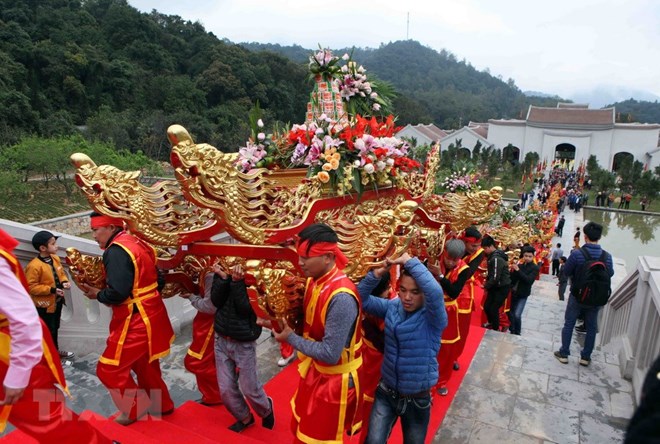
Various annual spring festivals have opened in the northern province of Quang Ninh in response to the National Tourism Year 2018 - Halong - Quang Ninh.

A palanquin
procession at the Yen Tu festival in Quang Ninh province (Photo: VNA)
Ngoa Van spring festival in Dong Trieu township, which started on
February 24 (the ninth day of the lunar year), drew 25,000 visitors on its
first three days.
Other festivals that attracted many visitors include Uong Bi
city’s Ba Vang temple and Yen Tu festivals, Van Ninh festival in Mong Cai city,
Luc Na festival in Binh Lieu district and Ha Long city’s Loi Am temple
festival.
Local authorities have paid heed to restoring relics, notably in
the Yen Tu relic site in Uong Bi.
This year, Uong Bi city has worked to ensure social order and
traffic safety and prevent fire and explosion. Kiosks will be arranged to
introduce tourism products and services to visitors.
In preparation for the festival, investments have been made in
infrastructure in the Yen Tu spiritual tourism site, including the upgrade of
the road to Yen Tu relic site and the construction of a new cable car system to
prevent traffic congestion.
The relic’s managing board has also worked to complete the first
phase of the Yen Tu festival tourism services centre, which features Truc Lam
palace, a Zen garden, a pilgrimage village and the King monk Tran Nhan Tong
museum.
Quang Ninh also stepped up monitoring and management in the
festivals to ensure safety for visitors.
In 2018, a series of festivals will be held in 14 localities of
Quang Ninh.
The province, home to the World Heritage site of Ha Long Bay, is
the host of the National Tourism Year 2018 themed "Ha Long-Heritage, Wonder,
Friendly Destination”. It is projected to host at least 51 cultural, sports and
tourism events throughout the year.
Highlights include the opening ceremony and Carnaval Ha Long 2018
in Ha Long city, which is scheduled for April 28.
Source: VNA
Spanning thousands of hectares and winding gracefully along mountain slopes, hillsides, and riverbanks, the terraced rice fields of Lac Son District present a stunning and captivating beauty. This region, renowned for its remarkable terraced landscapes, is also the centre of Hoa Binh Culture known for numerous archaeological sites.
The life of Mong people in Hang Kia and Pa Co communes of Mai Chau district has improved much thanks to tourism development.
The man-made Hoa Binh Lake, with a water surface area of approximately 9,000 hectares and a capacity of 9.45 billion cubic meters, stretches over 200 kilometers from Hoa Binh to Son La provinces. With the goal of developing into a national tourism area, the Hoa Binh Lake tourism area is expected to not only become the largest tourism centre in the province but also one of the 12 key tourist destinations in the northern midland and mountainous region of Vietnam.
Da Bia hamlet, now Duc Phong, in Tien Phong commune, Da Bac district, was once almost isolated from the outside as the only way to the hamlet was to get a boat ride across the Hoa Binh reservoir. However, as its tourism potential has been unleashed, the hamlet has established itself as one of the most attractive destinations on the tourism map. It has even received the ASEAN Community-Based Tourism Awards in 2019.
In the first 9 months of 2024, Mai Chau district, Hoa Binh province welcomed over 684 thousand visitors to visit and relax. In which, over 516 thousand domestic visitors and more than 168 thousand international visitors. Total revenue from tourism is estimated at over 821 billion VND.
Da Bac district, bestowed with stunning landscapes, is developing ecological and resort tourism offerings. Several tourist sites, put into operation this year, has attracted throngs of high-spending and young domestic visitors.



